The Problem with Power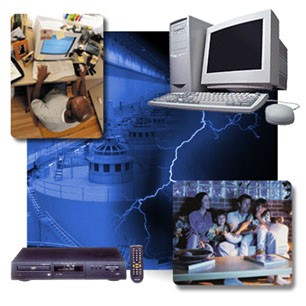
We live in the Information Age where
countless data is created, transmitted, and stored.
We live in the Electronics Age where numerous
electric-powered machines aid in business and
household tasks, as well as entertain and inform us.
The reality of living in this time
of technological innovation is that the power to run
these machines can't keep up (at least not yet). In
many locations around the world, electricity
generation, transmission and distribution have not
evolved at the same pace as computer and
communications equipment. What was built years ago
for powering factories producing manufactured goods
is struggling to adapt to provide continuous,
sufficient-grade power to sensitive electronics
processing valuable information.


What Is a Power Event?
Sags, surges, noise, spikes,
blackouts�what really happens to connected devices
when they experience a power anomaly? A lightning
strike is a frequent example, although it is just
one of countless problems that can strike your
equipment.
Imagine lightning has just struck a
nearby transformer. If the surge was powerful
enough, it travelled instantaneously through wiring
(AC, network, serial, phone lines and more) with the
electrical equivalent force of a tidal wave. For PC
users, the surge could have travelled into your
computer via the AC outlet or phone lines. The first
casualty is usually a modem or motherboard. Chips go
next, and data is lost.
Lightning Facts from APC
The utility responds to overvoltages
by disconnecting the grid. This creates brownouts
and blackouts. If the voltage drops low enough, or
blacks out, hard disks in computing machinery may
crash, destroying the data stored on the disks. In
all cases, work-in-progress stored in cache is
instantly lost. In the worst case, password
protection on the hard drives can be jumbled, or the
file allocation tables may be upset, rendering the
hard disks useless.

The Costs of Downtime
In the Information Age, data is
quite valuable. It is the livelihood of businesses
across the globe, whether in the form of financial
transactions or online purchases or customer
demographics or correspondence or spreadsheets or
any number of business applications.
The Internet has emphasized that
availability equals viability. If companies do not
have reliable solutions for the continuing operation
of their equipment, they lose money. If one
company's Web server goes down due to blackout,
customers are apt to click over to a competitor's.
If mission-critical computers involved in
manufacturing are damaged by a surge, inventory runs
behind and schedules are missed. If electronic noise
penetrates sensitive testing and measurement
machinery, delays are inevitable.
Power Events &
Their Effect on Your Equipment
Sags:
Also known as brownouts, sags are
short term decreases in voltage levels. This is the
most common power problem, accounting for 87% of all
power disturbances according to a study by Bell
Labs.
CAUSE -
Sags are usually caused by the
start-up power demands of many electrical
devices (including motors, compressors,
elevators, shop tools, etc.) Electric companies
use sags to cope with extraordinary power
demands. In a procedure known as rolling
brownouts, the utility will systematically lower
voltage levels in certain areas for hours or
days at a time. Hot Summer days, when air
conditioning requirements are at their peak,
will often prompt rolling brownouts.
EFFECT -
A sag can starve a computer of
the power it needs to function, and cause frozen
keyboards and unexpected system crashes which
both result in lost or corrupted data. Sags also
reduce the efficiency and life span of
electrical equipment, particularly motors.
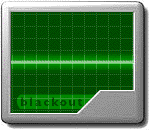
Blackout:
Total loss of utility power.
CAUSE -
Blackouts are caused by
excessive demand on the power grid, lightning
storms, ice on power lines, car accidents,
backhoes, earthquakes and other catastrophies.
EFFECT -
Current work in RAM or cache is
lost. The hard drive File Allocation Table (FAT)
may also be lost, which results in total loss of
data stored on drive.
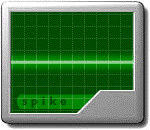
Spike:
Also referred to as an impulse, a
spike is an instantaneous, dramatic increase in
voltage. Akin to the force of a tidal wave, a spike
can enter electronic equipment through AC, network,
serial or phone lines and damage or completely
destroy components.
CAUSE -
Spikes are typically caused by a
nearby lightning strike. Spikes can also occur
when utility power comes back on line after
having been knocked out in a storm or as the
result of a car accident.
EFFECT -
Catastrophic damage to hardware
occurs. Data will be lost.
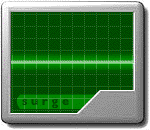
Surge:
A short term increase in voltage,
typically lasting at least 1/120 of a second.
CAUSE -
Surges result from presence of
high-powered electrical motors, such as air
conditioners, and household appliances in the
vicinity. When this equipment is switched off,
the extra voltage is dissipated through the
power line.
EFFECT -
Computers and similar sensitive
electronic devices are designed to receive power
within a certain voltage range. Anything outside
of expected peak and RMS (considered the average
voltage) levels will stress delicate components
and cause premature failure.
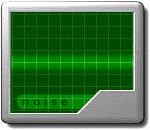
Noise:
More technically referred to as
Electro-Magnetic Interference (EMI) and Radio
Frequency Interference (RFI), electrical noise
disrupts the smooth sine wave one expects from
utility power.
CAUSE -
Electrical noise is caused by
many factors and phenomena, including lightning,
load switching, generators, radio transmitters
and industrial equipment. It may be intermittent
or chronic.
EFFECT -
Noise introduces glitches and
errors into executable programs and data files.
According to a study by IBM,
more than 120 disturbances hit a typical
computer in a typical month! Some have
imperceptible effects. Others cause data loss
and expensive repairs.
Don't take the risk. For more
information on how you can benefit from a UPS,
please give us a call so we can provide you with all
the information you need. We will help find the
right product solution for you to best suit your
equipment size & requirements.
